Learn how to make homemade lemon pepper seasoning with just a few ingredients. It’s great on chicken, fish and roasted vegetables and makes for a perfect edible gift. In this recipe, I will show you two methods: using fresh lemons and store-bought dried lemon peel.
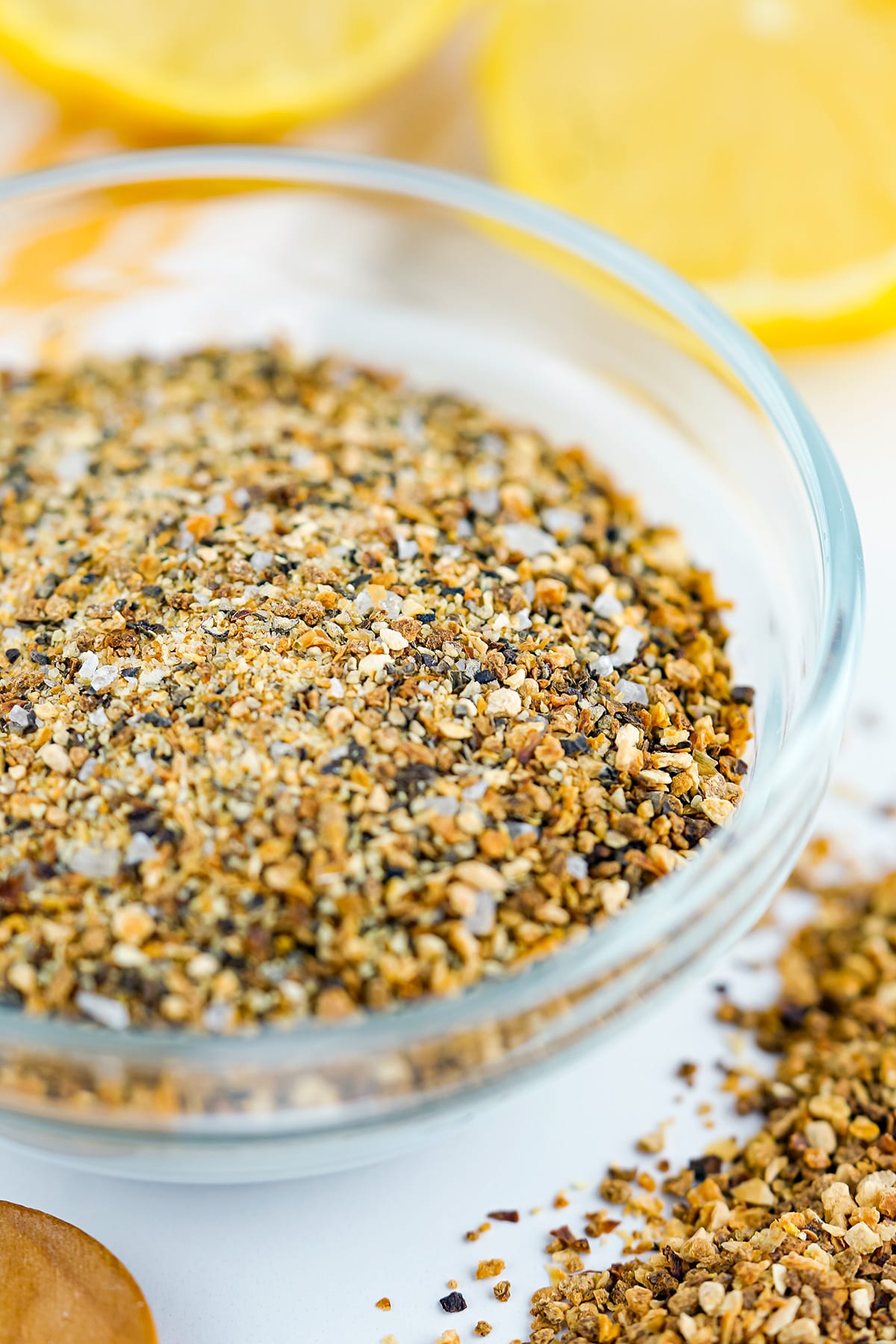
In This Post:
- 🍋 Recipe Overview
- 🛒 Ingredients
- 📷 How To Make
- 🫙 Storing Lemon Pepper
- 🍽How To Use Lemon Pepper
- 📝 Go To Full Recipe
Homemade Lemon Pepper Seasoning
If you enjoy making your spice blends at home, you’re going to love this easy lemon pepper seasoning recipe. Bursting with citrusy lemon and with only a couple of added seasonings to support the overall flavour, this pantry staple is easy and quick to make.
It’s versatile, keeps well and makes for a great gift. Let’s make it!
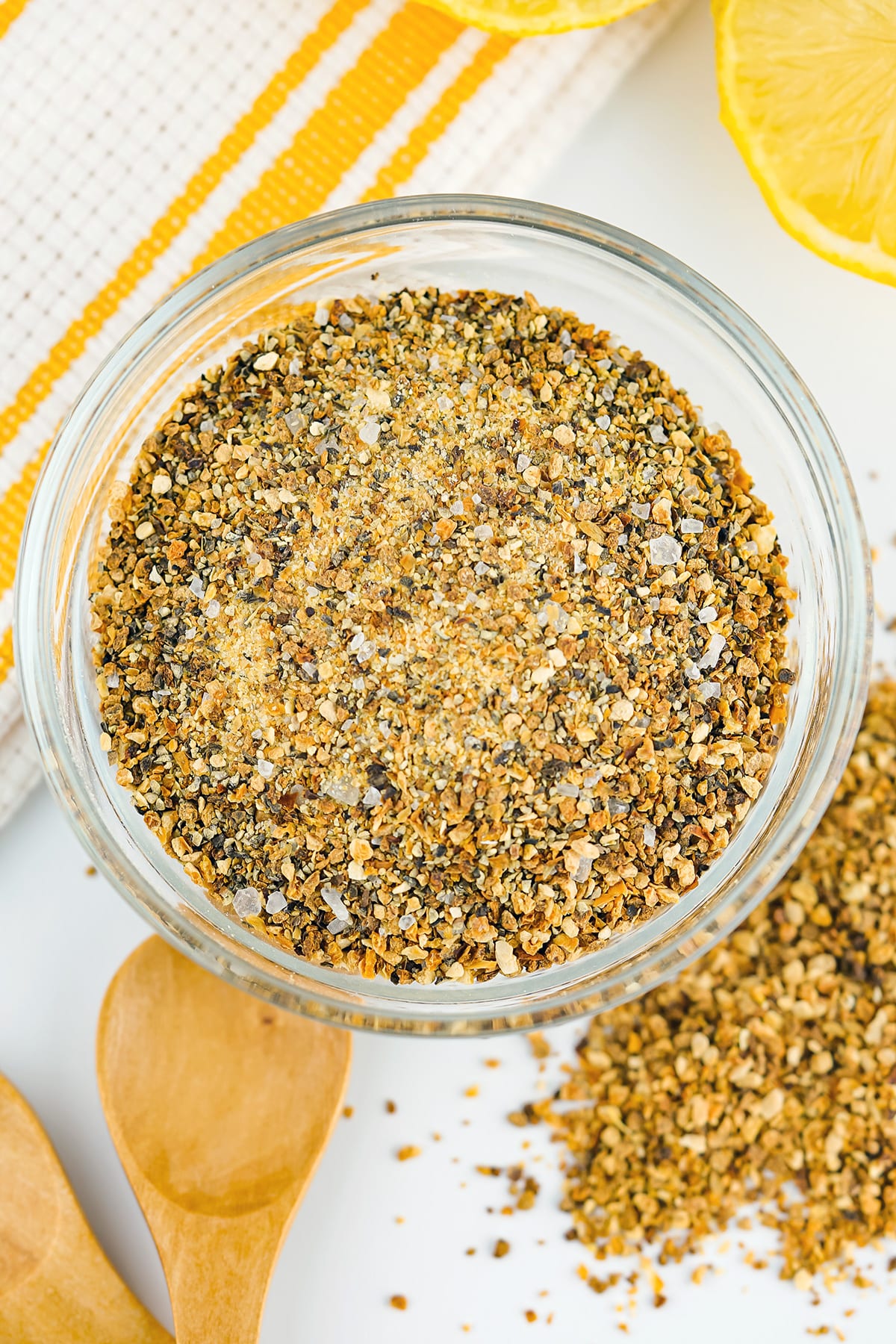
What You’ll Need
Lemon peel – for this recipe you need a granulated, dried lemon peel. You have two options.
Option 1 (takes time but is cheaper): use fresh lemons, which you will need to peel thinly and dehydrate in the oven at low temperature (instructions below); then, you will need to use a spice grinder or a high-speed blender to process the dehydrated lemon peel into a coarse powder.
Option 2 (the speedy version): you can buy granulated, dehydrated lemon peel from specialty ingredient stores, spice stores, delis and online (e.g. Amazon). Make sure you don’t buy the super fine lemon powder, which is used as a beauty product.
It’s not a cheap ingredient BUT it takes a lot of lemon and some time to make it, so it’s worth the money. Store-bought dried lemon peel is not cheap BUT it takes a lot of lemons and some time to make it, so it’s worth the money. As well as making seasonings, you can use it to infuse tea (it’s amazing, in fact!) and to add to baked goods (I love it in lemon cookies and lemon cake).
Black pepper – you can use black peppercorns, which you will need to grind yourself, for optimal flavour; pre-ground coarse black pepper is also fine but use the freshest, most recently purchased stuff.
Other seasoning flavours – salt, onion powder and garlic powder; these three will elevate and round up the flavour of the seasoning. Salt also helps to preserve the seasoning for longer.
Kitchen Tip: Don’t throw away those small spice jars once they’re finished. I always keep a few at the back of the cupboard for whenever I decide to make my own blend or store some leftover taco seasoning.
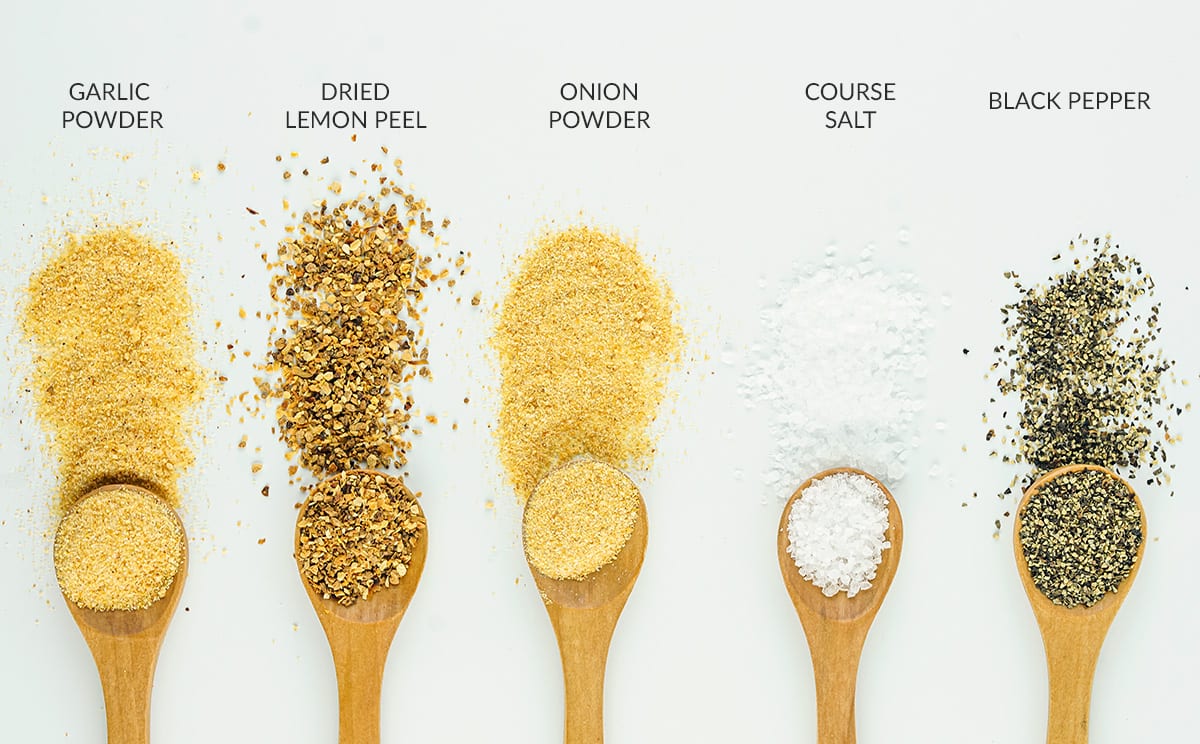
How To Make Lemon Pepper Seasoning
Below are two methods for making this seasoning: using fresh lemons and using store-bought dehydrated peel.
Using Fresh Lemons
- Preheat oven to its lowest setting (around 50-75 C / 122 – 165 F).
- Using a paring knife or peeler, remove the outer yellow from the lemon. You want it as thin as possible, not much white pith.
- Line a flat sheet pan with parchment/baking paper and lay out the strips of lemon as spread out as possible. Place in the oven and leave to bake/dehydrate for 2-3 hours, maybe longer. It should feel completely dried out.
- Remove the dried lemon peel and let it cool down completely out of the oven. Transfer to into a spice grinder or a high-powered blender, processing until you get a fine coarse texture.
- Remove to a bowl. Repeat the grinding with black peppercorns, if using whole, until coarse powder as well.
- Measure out the lemon and pepper and mix in the salt, onion powder and garlic powder.
- Store in an air-tight jar in a cool, dry place. Store any leftover lemon separately for other uses like tea and baking.
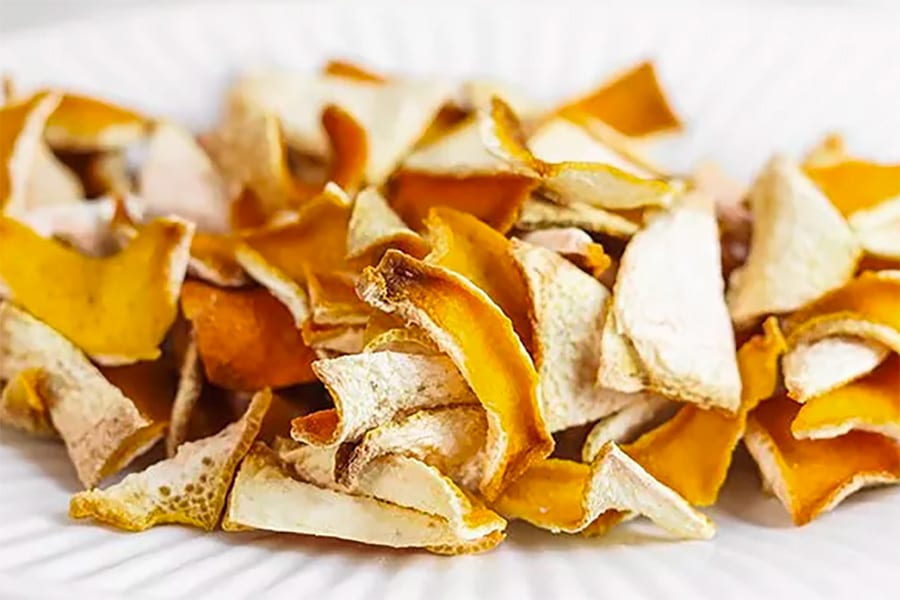
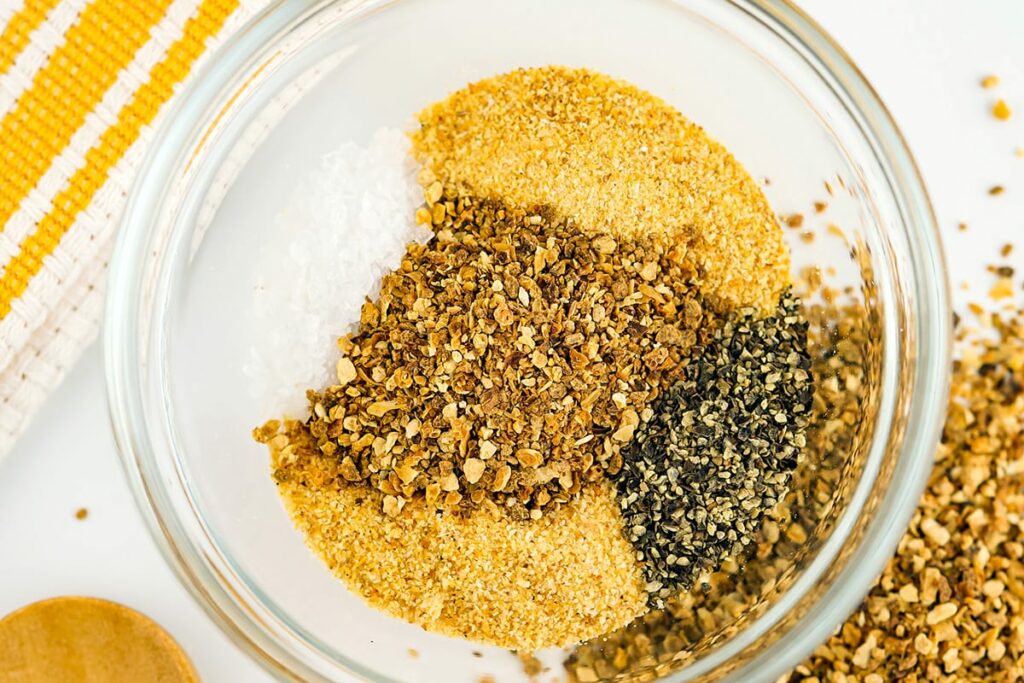
Using Granulated Dried Peel
If you find pre-made dried lemon peel, you can skip the dehydrating part. If you get an unprocessed dried peel, then repeat the grinding step from above. If it’s already granulated, skip to grinding the peppercorns. If using pre-ground black pepper, then simply mix all seasoning ingredients in a bowl and store them in an air-tight jar in a cool, dry place.
How Long Does Lemon Pepper Seasoning Last
- As with most seasonings, it should be kept for at about 3-6 months for optimal flavour. It can be stored for longer, however the potency of the flavour and the aroma will start to decline after that.
- Keep in mind that this is a homemade lemon pepper seasoning without the added stabilizers or preservatives you might find in commercial products. As such, it doesn’t keep for as long.
- Storing it in a freezer will lengthen its freshness. I will often divide the mixture into two small jars and keep one in the pantry and one in the freezer.
- Another factor to consider is humidity! If you’re in the middle of Australian summer, especially on the East Coast, the moisture in the air can penetrate your spice and seasoning jars unless they are super tightly closed. Adding a few rice kernels can help to absorb the moisture and keep the spices dry for longer.
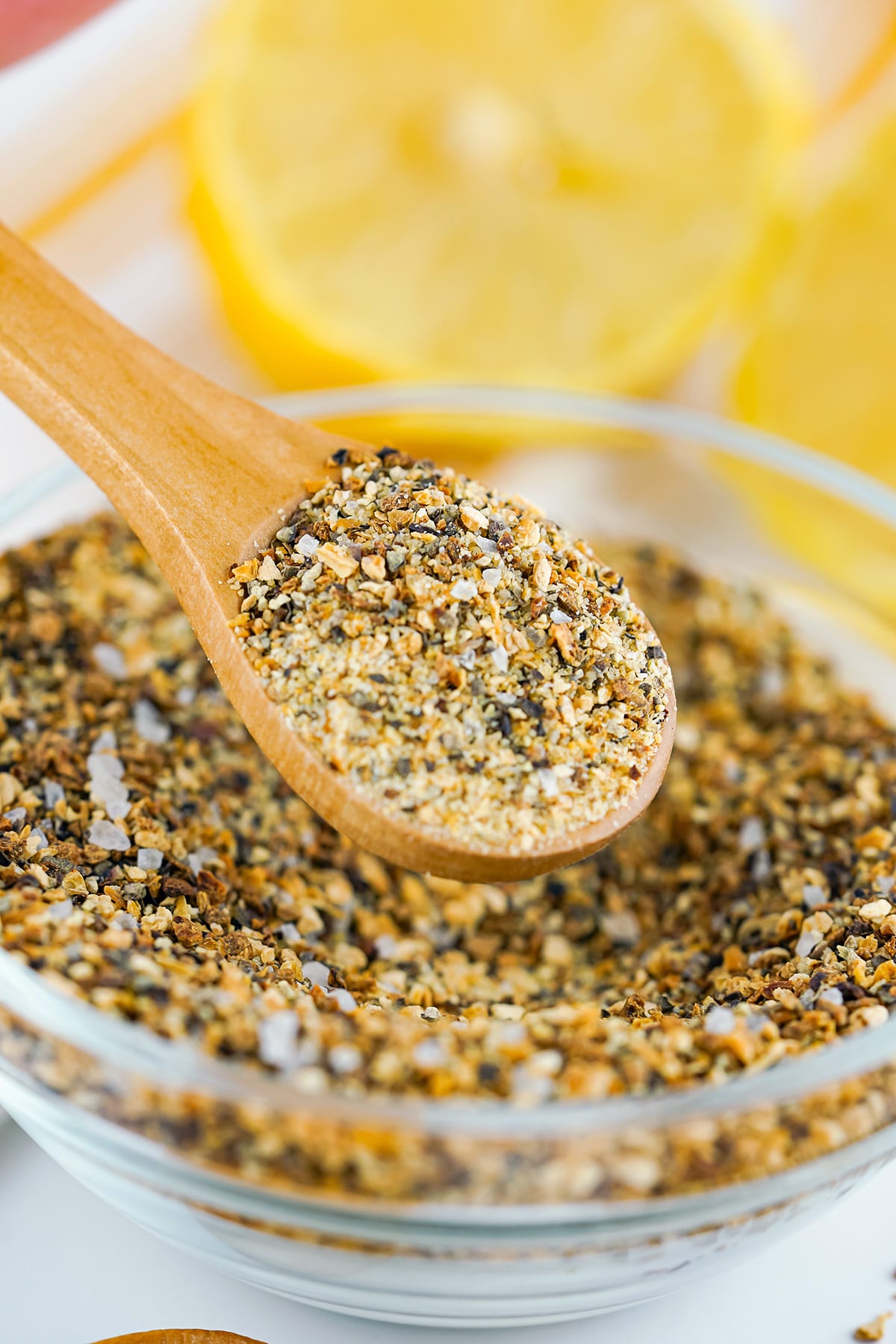
How To Use Lemon Pepper
- Use this seasoning like you would any store-bought lemon pepper. Whatever a recipe calls for, that’s how much you would use. If a recipe doesn’t have an amount, add based on taste.
- It’s fabulous with white meat like chicken, turkey and pork. I love it on chicken wings in particular. Try it in my dry rub chicken wings recipe.
- Sprinkle over baked salmon or white fish before grilling for a citrusy, peppery flavour.
- I also love adding it to an Asian stir-fry, sprinkled over steamed green beans or snow peas, over buttery corn on the cob, and as a seasoning for roasted or grilled vegetables. Another use is to sprinkle over avocado toast.
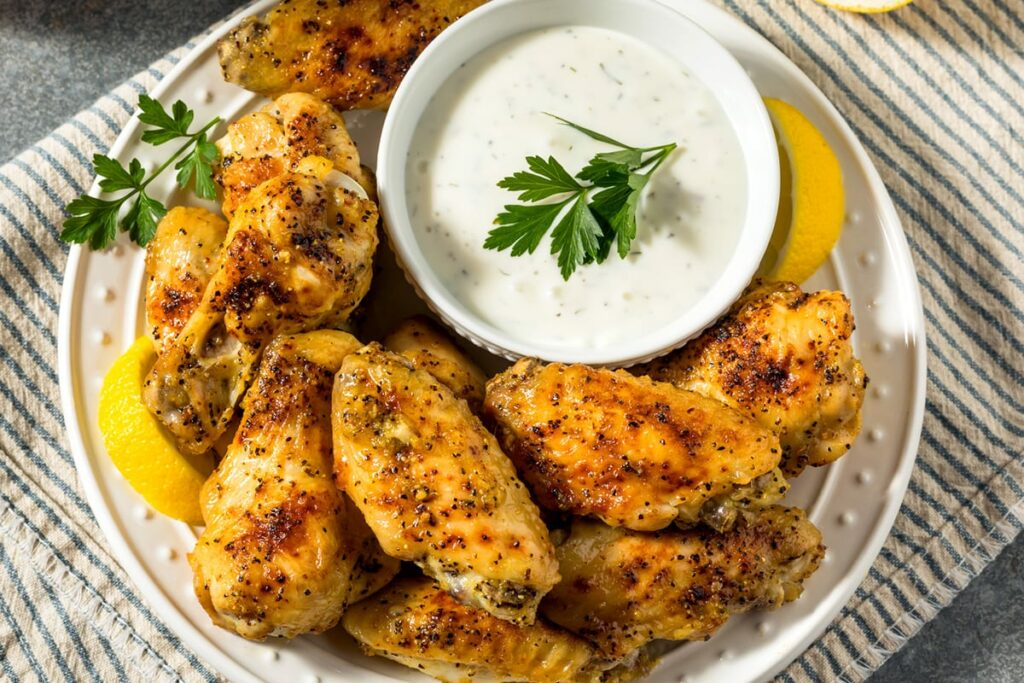
More Recipes
Want to Save This Recipe?
Enter your email & I’ll send it to your inbox. Plus, get great new recipes from me every week!
By submitting this form, you consent to receive emails from Cooked & Loved
Want to Save This Recipe?
Enter your email & I’ll send it to your inbox. Plus, get great new recipes from me every week!
By submitting this form, you consent to receive emails from Cooked & Loved
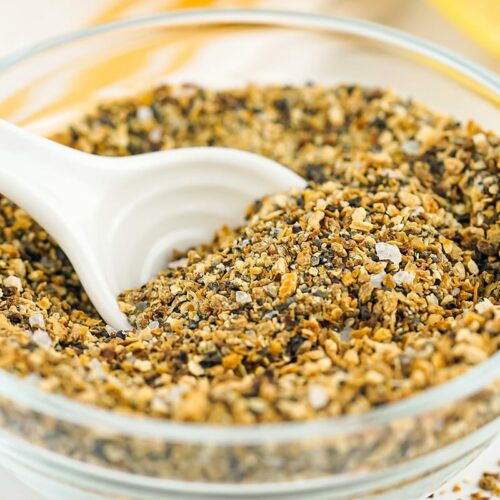
Ingredients
- 6 lemons large or 4 tablespoons dried lemon peel (granulated lemon peep, not the powder)
- 2 tablespoon black peppercorns or 1.5 tablespoons ground coarse black pepper
- 1 tablespoon onion powder
- 2 teaspoons salt coarse sea salt or kosher salt
- 1 teaspoons garlic powder
Instructions
Using fresh lemons
- Preheat oven to its lowest setting (around 50-75 C / 122 – 165 F).
- Using a paring knife or peeler, remove the outer yellow from the lemon. You want it as thin as possible, not much white pith.
- Line a flat sheet pan with parchment/baking paper and lay out the strips of lemon as spread out as possible. Place in the oven and leave to bake/dehydrate for 3-4 hours, maybe longer depending on humidity. It should feel completely dried out. **PS.** You can also use an air fryer on the lowest setting for about an hour or use the oven at a higher temp for a shorter period, although this is risky as you can easily burn the lemon peel.
- Remove the dried lemon peel and let it cool down completely out of the oven. Transfer to into a spice grinder or a high-powered blender, processing until you get a fine coarse texture.
- Remove to a bowl. Repeat the grinding with black peppercorns, if using whole, until coarse powder as well.
- Measure out the lemon and pepper and mix in the salt, onion powder and garlic powder.
- Store in an air-tight jar in a cool, dry place. Store any leftover lemon separately for other uses like tea and baking.
Using store-bought dried lemon peel
- If you find pre-made dried lemon peel, you can skip the dehydrating part. If you get an unprocessed dried peel, then repeat the grinding step from above. If it’s already granulated, skip to grinding the peppercorns. If using pre-ground black pepper, then simply mix all seasoning ingredients in a bowl and store them in an air-tight jar in a cool, dry place.
Notes
- This seasoning can be adjusted to suit your tastes. Once mixed, do a taste test and adjust to your preferences. Some like more lemon zest, some like more pepper, some like to swap the garlic and onion amounts, etc. It’s all up to you, but this is a great starting point.
- You must buy high-quality ingredients for the best flavour profile. If you buy cheap ingredients, it will reflect in the finished taste.
- Use this seasoning like you would any store-bought lemon pepper. Whatever a recipe calls for, that’s how much you would use. If a recipe doesn’t have an amount, add based on taste.
- See more notes on ingredients above in the What You’ll Need section.

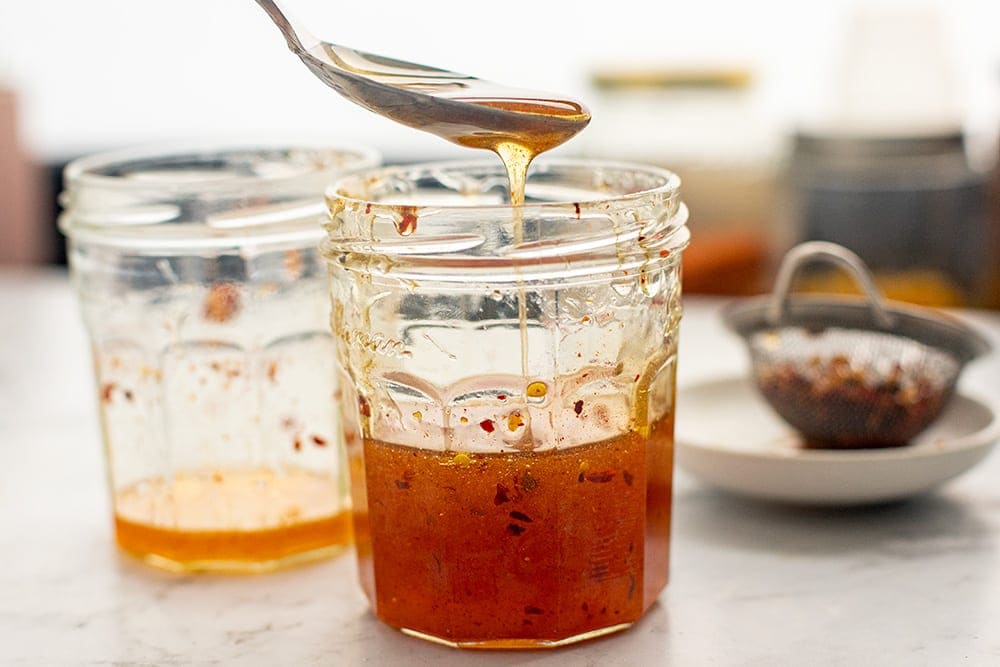
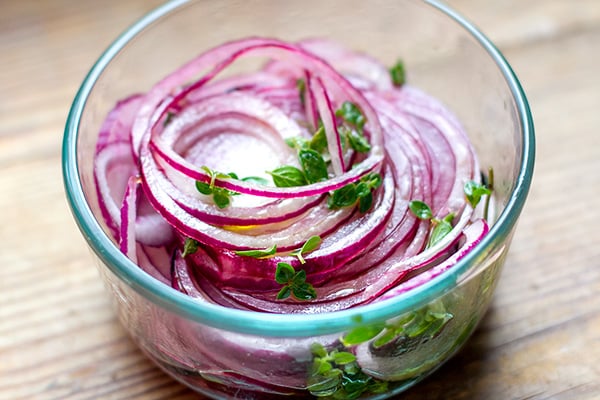
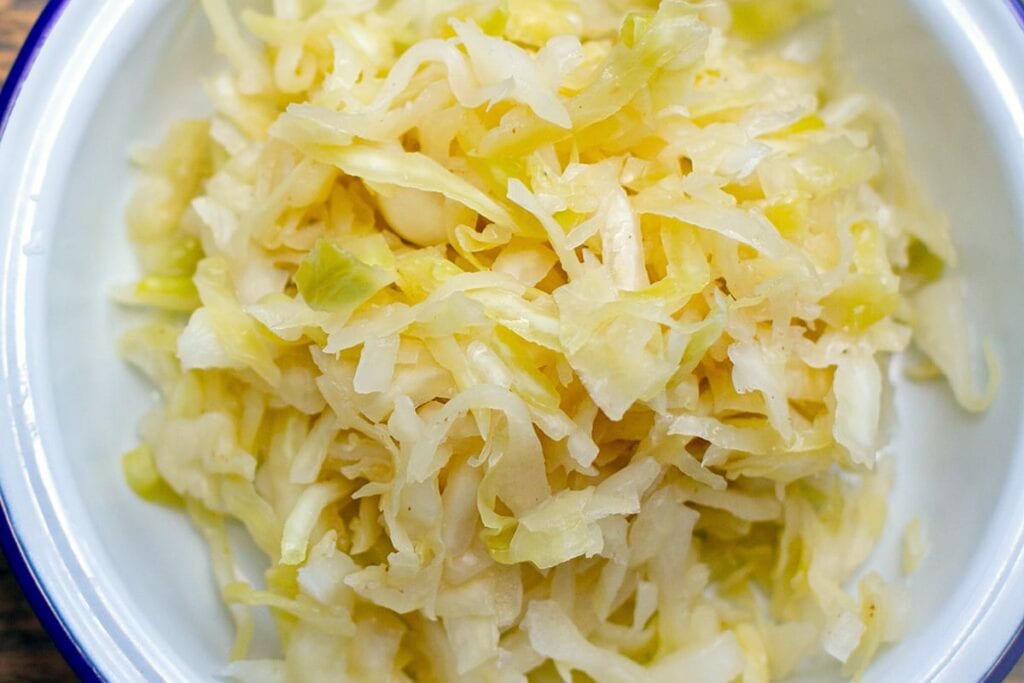
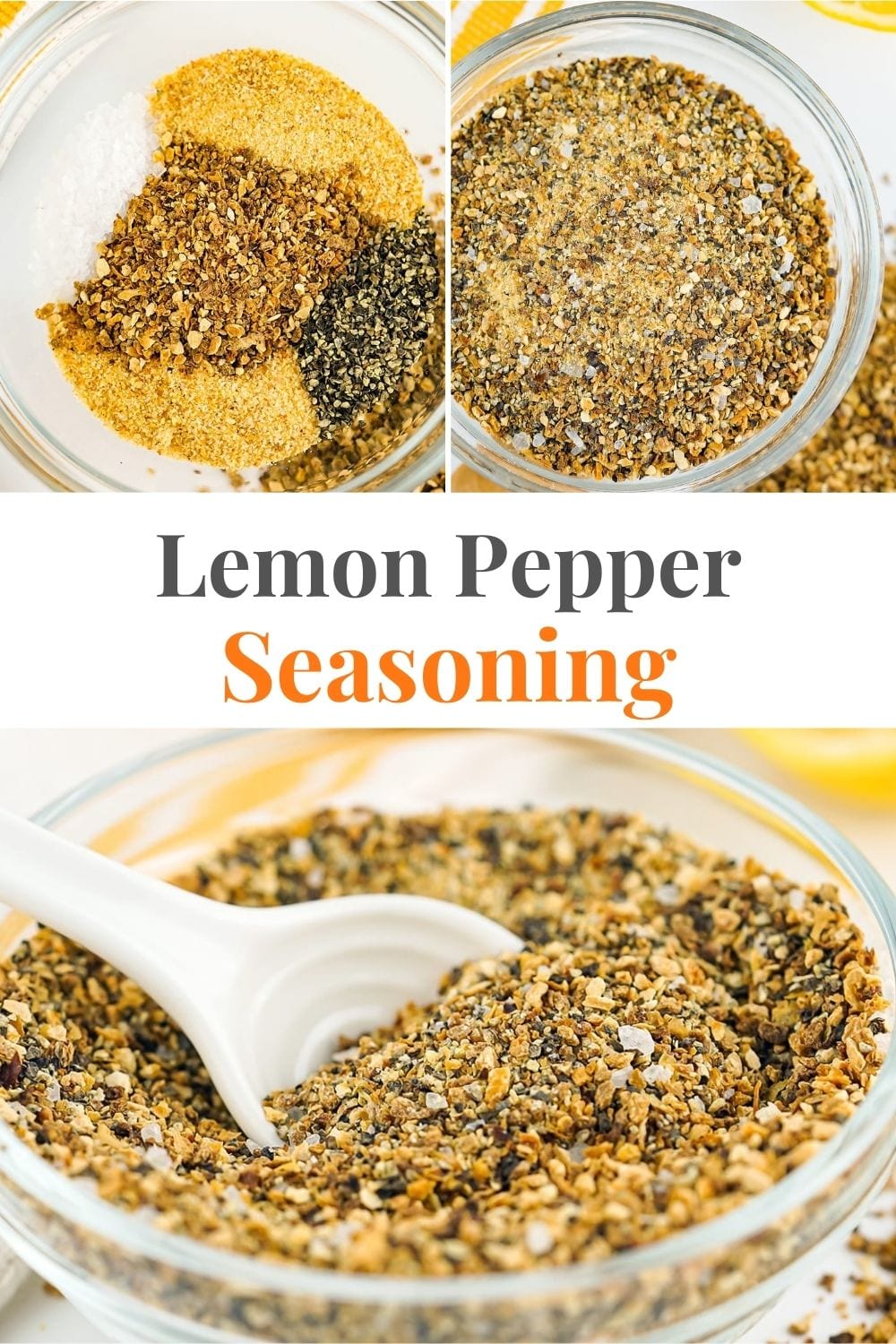


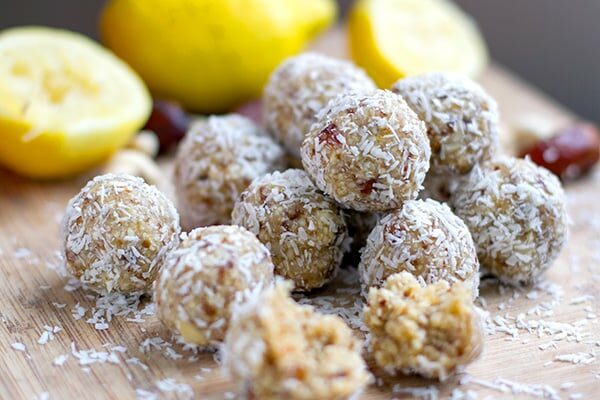
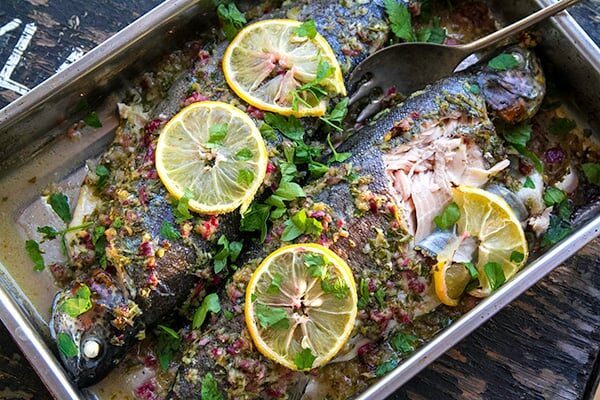
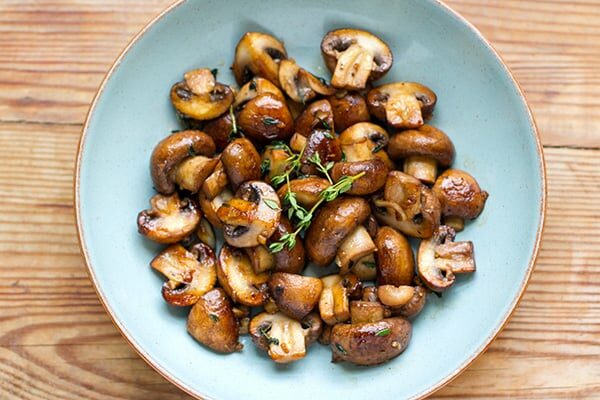
I’ve never thought to make lemon pepper at home! One of of my favorite seasonings. This is sooo much better than store bought!
This seasoning was fantastic to us grilling some fresh trout that I recently caught. Thank you for bring it to the next level.
This sounds like it would be delicious on so many things! Thanks for sharing this recipe.
I love lemon pepper, and your homemade seasoning is just the right amount of tang and spiciness!
Homemade seasonings are my favorite! I used this lemon pepper seasoning on chicken last night and it was perfect. Definitely keeping a jar in the pantry!
This is so good and SO much better than a lot of the generic ones you buy. There’s always something that tastes off with those. This is so nice and fresh!
There is nothing quite like the rich, tangy flavors of lemon pepper seasoning! I ant to sprinkle it on everything!
Excellent blend! This seasoning was perfect for my grilled wings – it added so much flavor depth!
The combination of zesty lemon and bold pepper flavors added a refreshing twist to my meals. It’s now a staple in my kitchen for adding extra flavor to dishes.
Oh, I had never made lemon pepper before. We have a lemon tree and always have extra, this is a super delicious way to use them up and have them last!